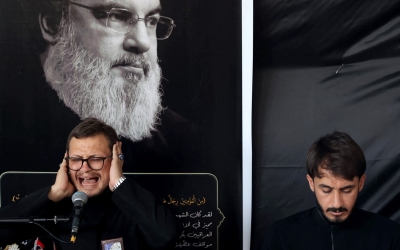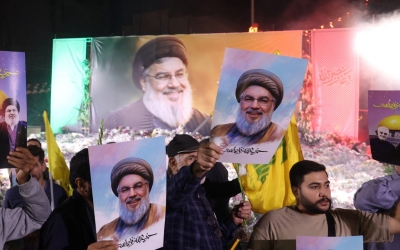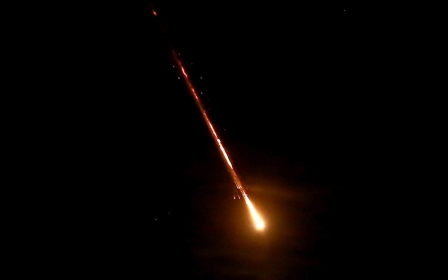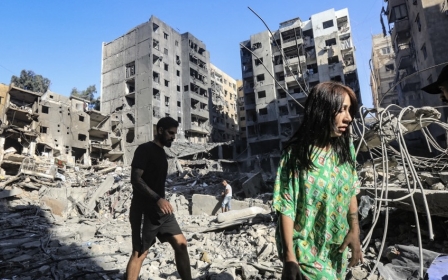'Strong, calibrated and successful': Iran strikes on Israel sought to illustrate military strengths
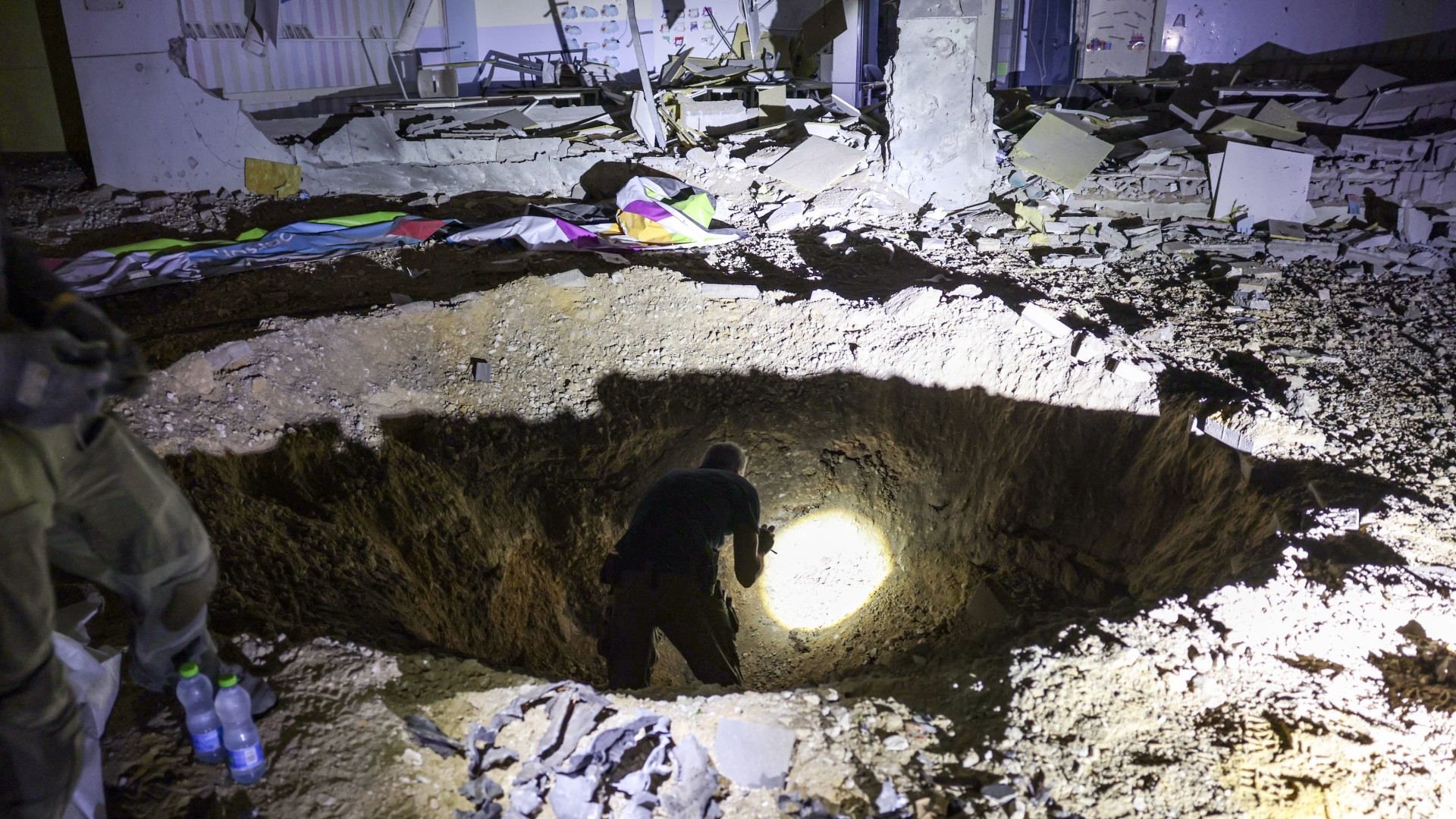
Iran's decision to fire a wave of ballistic missiles at Israel was aimed at illustrating its military strengths and restore a sense of credibility to its security establishment after a series of a high-profile assassinations, Iranian officials and diplomatic sources have said.
In a massive show of force, Iran fired at least 180 ballistic missiles shortly after 20:00 local time on Tuesday, around 19:30 in Israel, with dozens of projectiles seen streaming over the skies of Tel Aviv and Jerusalem.
Videos seen by Middle East Eye showed an apparent missile exploding in the vicinity of the Mossad intelligence headquarters on the northern outskirts of Tel Aviv.
A number of impact sites were also identified across central Israel, with Iran's state television claiming that 80 percent of the missiles hit their targets.
Interceptions by Israel's air defence systems, which are intended to destroy missiles or shoot them off-course, have made it difficult to determine whether the eventual landing sites of missiles or debris were the intended target or not.
New MEE newsletter: Jerusalem Dispatch
Sign up to get the latest insights and analysis on Israel-Palestine, alongside Turkey Unpacked and other MEE newsletters
Meanwhile, Israel's military censor, as a matter of policy, has barred local and international media outlets from publishing the details of the exact locations targeted.
Shortly after the attacks began, Iran's Islamic Revolutionary Guard Corps (IRGC) said the missiles were launched in response to the July killing of Hamas politburo chief Ismail Haniyeh in Tehran, as well as last week's killings of Hezbollah leader Hassan Nasrallah and IRGC commander Abbas Nilforoushan in Lebanon.
"After a period of restraint in the face of the violation of the sovereignty of the Islamic Republic of Iran in the assassination of Ismail Haniyeh by the Zionist regime, and in accordance with the country’s right to self-defence under the UN Charter... the IRGC Aerospace Force targeted key military and security installations in the heart of the occupied territories," it said.
Then, General Mohammad Bagheri, the chief-of-staff of Iran's Armed Forces, appeared on state TV from the command control room, from where the attack was reported to have been spearheaded from.
"Only military bases were targeted, including three main air bases of the Zionist regime: the Mossad as a centre for assassination, the Nevatim air base, which houses F-35 aircraft, and the Hatzor [Hatzarim] air base, which was used for the assassination of our dear martyr [Hassan] Nasrallah," Bagheri said.
"Strategic radars, as well as areas where tanks, armoured vehicles, and personnel of the regime around Gaza, who were responsible for the massacre of the people of Gaza, were also targeted," he added.
On Thursday, satellite images published by the Associated Press news agency showed at least two impact sites at the Nevatim air base. However, it was unclear whether the damage was caused directly by the ballistic missiles or by shrapnel from interceptions.
A conservative Iranian source, who spoke to MEE on condition of anonymity due to sensitivities surrounding the issue, said the barrage caught Israel by "surprise," adding that Israel failed to intercept several of the missiles due to a "strong cyber operation against the defence systems".
He added that during the attack, "missiles were also launched from underground silos, whereas previously, launches were only [carried out] from ground-based launchers".
Iran is known to have constructed several deep underground missile facilities, many of which are believed to be dug deep into its mountains to protect them from potential attacks by US bombers.
'Everything has changed'
A former senior Iranian diplomat, who also requested anonymity, described Tuesday's attack as "strong, calibrated, and successful," adding that it was far more effective than the earlier barrage in April and also yielded other "important" benefits.
"Israel now understands the extent of Iran's missile reach and that in the event of any retaliation, Tehran would respond - not with 200 missiles - but with many more," he said.
'Israel now understands the extent of Iran's missile reach and that in the event of any retaliation, Tehran would respond - not with 200 missiles - but with many more'
- former Iranian diplomat
The diplomat added that Israel had been actively "promoting propaganda in Arab societies against Iran, even in Lebanon, suggesting that Tehran had abandoned its allies. They were being successful in this propaganda, but now everything has changed."
Since Nasrallah's assassination, Iran's Supreme Leader Ayatollah Ali Khamenei, who has remained in a secure location inside Iran since Saturday, has repeatedly issued statements expressing his personal anguish over the killing.
Reuters reported that days before his killing, Khamenei sent Nasrallah a message urging him to leave Lebanon for Iran, citing intelligence reports that suggested Israel had operatives within Hezbollah and was planning to kill him.
Following the July assassination of Haniyeh, Iran arrested more than two dozen people, including senior intelligence officers, at the military-run guesthouse where the Hamas leader was staying.
'Restored a sense of credibility'
A foreign policy analyst told MEE that unlike the telegraphed attack carried out in April, Tuesday's barrage of missile strikes was aimed at showcasing Tehran's missile capabilities.
The analyst said that Iran's use of ballistic and hypersonic missiles, along with the element of surprise, not only demonstrated power but also highlighted Iran's determination to defend its interests and respond to Israel in the event of any further provocations.
'Iran's response also restored a sense of credibility to its retaliatory capabilities, both in the eyes of its domestic public and its regional allies'
- foreign policy analyst
Another foreign policy analyst who writes for reformist media told MEE that given Israel’s extensive attacks on southern Lebanon, and its repeated crossing of Iran's red lines, the Iranian leadership believed the only way to potentially stop Netanyahu was through such attacks that would dismantle his perceived sense of victory.
"In addition to demonstrating Iran's deterrence against Israel, Iran's response also restored a sense of credibility to its retaliatory capabilities, both in the eyes of its domestic public and its regional allies," the analyst added.
Iran's ballistic missile arsenal, the largest of any country in the Middle East, is almost entirely homegrown. In recent years, the Islamic Republic has demonstrated the ability to upgrade some systems, improving their range and precision.
A senior Iranian source, who spoke to MEE on condition of anonymity, said that whilst the attacks were ongoing, Tehran sent a message warning the US that should Israel retaliate, such as targeting its oil refineries, Iran would strike important infrastructure and oil refineries in regional countries such as Azerbaijan, which is believed to be a major source of energy resources for Israel's war effort.
A few IRGC-affiliated Iranian outlets on Telegram also reported that oil refineries and oil wells in Saudi Arabia, the United Arab Emirates and Bahrain were among potential targets.
'Iran is ready for any attack'
An Iranian source in the country's establishment, who requested anonymity due to sensitivities surrounding the topic, said the decision to attack Israel was approved by Supreme Leader Ayatollah Ali Khamenei and supported by President Masoud Pezeshkian.
Pezeshkian had faced mounting criticism in recent weeks over his calls for Tehran not to mount a military reprisal after the July assassination of Haniyeh.
MEE reported at the time Haniyeh, a veteran Hamas official who had played a key role in talks for a potential ceasefire in Gaza, was killed by a projectile fired at his room.
Pezeshkian has reportedly said he didn't respond to Haniyeh's death because he had been given assurances that Israel was on the verge of signing a ceasefire deal within a week or two. No such deal occurred.
Pezeshkian repeated this position when he met with the Qatari emir on Wednesday saying western nations had made empty promises to Iran, urging it to show restraint in hopes of securing a ceasefire in Gaza.
During a press conference in Doha, Pezeshkian warned of a strong response if Israel carries out further escalatory moves against it, after Israeli Prime Minister Benjamin Netanyahu's government threatened to respond to Tehran's latest attacks.
"We will respond more strongly and harshly if Israel responds to us," Pezeshkian said. "The security of the region is the security of all Muslims and we do not look forward to war, but we look forward to peace and calm," he added.
A conservative figure, who spoke to MEE on condition of anonymity, said that despite the offensive leaving the region on edge, "Iran is ready for any attack."
"Our commanders knew that unlike previous operations, this time in case of a response, the goal was to demonstrate real power, so the [Israeli] regime would definitely respond," the figure said.
"Therefore, the defence systems have now been strengthened during the summer. Preparations were made in advance, especially in sensitive locations," they added.
Middle East Eye delivers independent and unrivalled coverage and analysis of the Middle East, North Africa and beyond. To learn more about republishing this content and the associated fees, please fill out this form. More about MEE can be found here.


